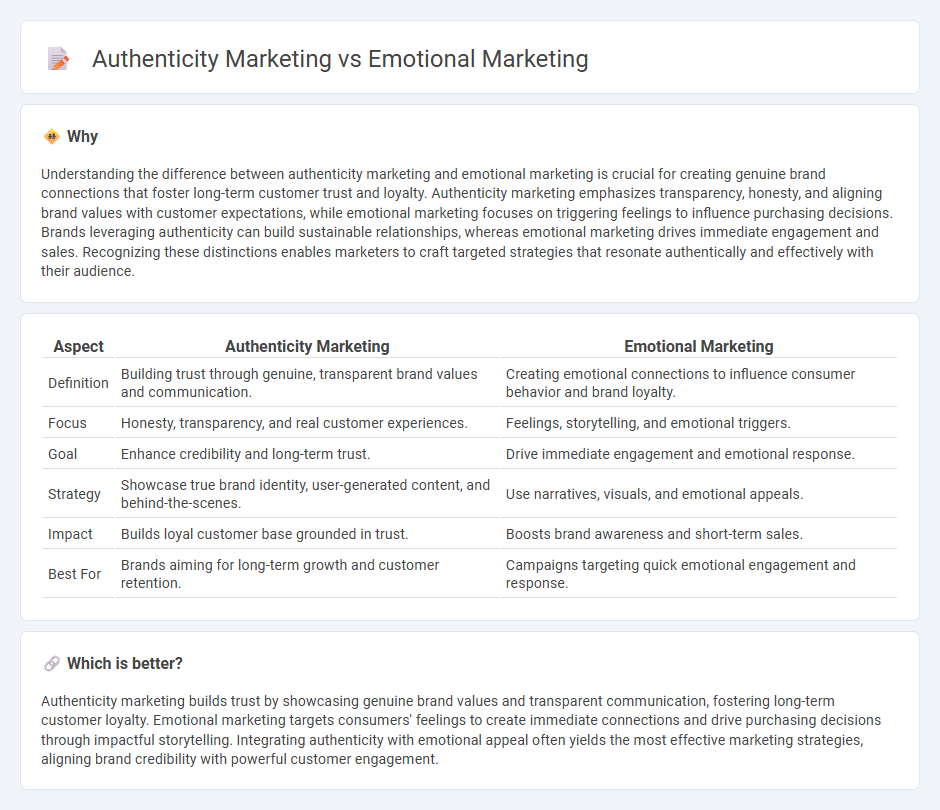
Authenticity marketing focuses on building genuine connections by showcasing brand transparency and real customer experiences, enhancing trust and loyalty. Emotional marketing aims to evoke feelings that resonate deeply with the target audience to drive engagement and memorable brand interactions. Discover how combining these strategies can transform your marketing approach.
Why it is important
Understanding the difference between authenticity marketing and emotional marketing is crucial for creating genuine brand connections that foster long-term customer trust and loyalty. Authenticity marketing emphasizes transparency, honesty, and aligning brand values with customer expectations, while emotional marketing focuses on triggering feelings to influence purchasing decisions. Brands leveraging authenticity can build sustainable relationships, whereas emotional marketing drives immediate engagement and sales. Recognizing these distinctions enables marketers to craft targeted strategies that resonate authentically and effectively with their audience.
Comparison Table
| Aspect | Authenticity Marketing | Emotional Marketing |
|---|---|---|
| Definition | Building trust through genuine, transparent brand values and communication. | Creating emotional connections to influence consumer behavior and brand loyalty. |
| Focus | Honesty, transparency, and real customer experiences. | Feelings, storytelling, and emotional triggers. |
| Goal | Enhance credibility and long-term trust. | Drive immediate engagement and emotional response. |
| Strategy | Showcase true brand identity, user-generated content, and behind-the-scenes. | Use narratives, visuals, and emotional appeals. |
| Impact | Builds loyal customer base grounded in trust. | Boosts brand awareness and short-term sales. |
| Best For | Brands aiming for long-term growth and customer retention. | Campaigns targeting quick emotional engagement and response. |
Which is better?
Authenticity marketing builds trust by showcasing genuine brand values and transparent communication, fostering long-term customer loyalty. Emotional marketing targets consumers' feelings to create immediate connections and drive purchasing decisions through impactful storytelling. Integrating authenticity with emotional appeal often yields the most effective marketing strategies, aligning brand credibility with powerful customer engagement.
Connection
Authenticity marketing fosters trust by promoting genuine values and transparent communication, which deepens emotional connections between brands and consumers. Emotional marketing leverages these connections to evoke feelings that enhance brand loyalty and influence purchasing decisions. Together, they create a powerful strategy that aligns brand identity with customer emotions, driving sustained engagement.
Key Terms
**Emotional Marketing:**
Emotional marketing leverages feelings such as happiness, fear, or nostalgia to create powerful connections between brands and consumers, driving engagement and loyalty. Brands like Coca-Cola and Apple excel in emotional marketing by crafting compelling stories that resonate deeply and inspire trust. Discover how emotional marketing strategies can transform your brand's impact and customer relationships.
Storytelling
Emotional marketing leverages storytelling to evoke feelings that connect consumers to a brand, creating memorable experiences that drive loyalty and engagement. Authenticity marketing uses genuine narratives reflecting real values and transparent communication, fostering trust and credibility with the audience. Explore how combining emotional appeal with authentic storytelling can powerfully transform your marketing strategy.
Brand Attachment
Emotional marketing leverages feelings and experiences to forge strong Brand Attachment by creating memorable, relatable campaigns that resonate deeply with consumers. Authenticity marketing emphasizes transparency and genuine brand values, fostering trust and long-term loyalty through consistent, honest communication. Discover how balancing emotional appeal with authenticity strengthens brand attachment effectively.
Source and External Links
20 Emotional Marketing Examples to Take Inspiration From - Emotional marketing uses targeted emotional appeals aligned with a brand's values to create authentic content and consistent messaging that builds strong customer connections and loyalty.
Emotional Marketing: The Power of Authentic Connections - Emotional marketing connects brands and audiences through storytelling and evoking feelings, emphasizing authenticity to resonate deeply and influence purchasing decisions beyond rational reasoning.
What is Emotional Marketing Everyone Is Talking About? - Emotional marketing is the deliberate use of persuasive messages that evoke specific emotions to form deep audience connections and drive desired actions, often resulting in improved sales performance.
 dowidth.com
dowidth.com